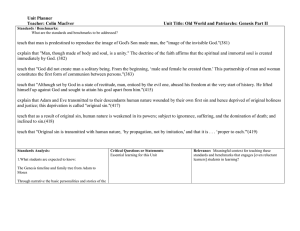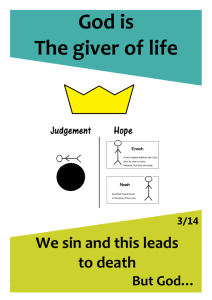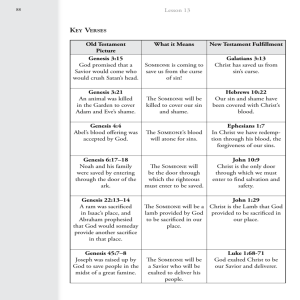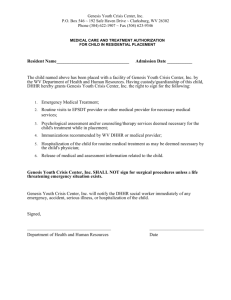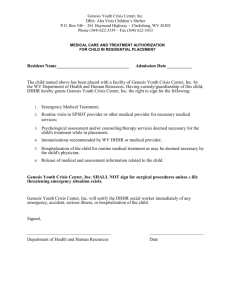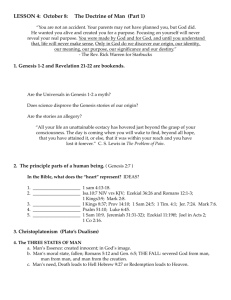Kenya Summary Booklet FINAL revised jh to
advertisement
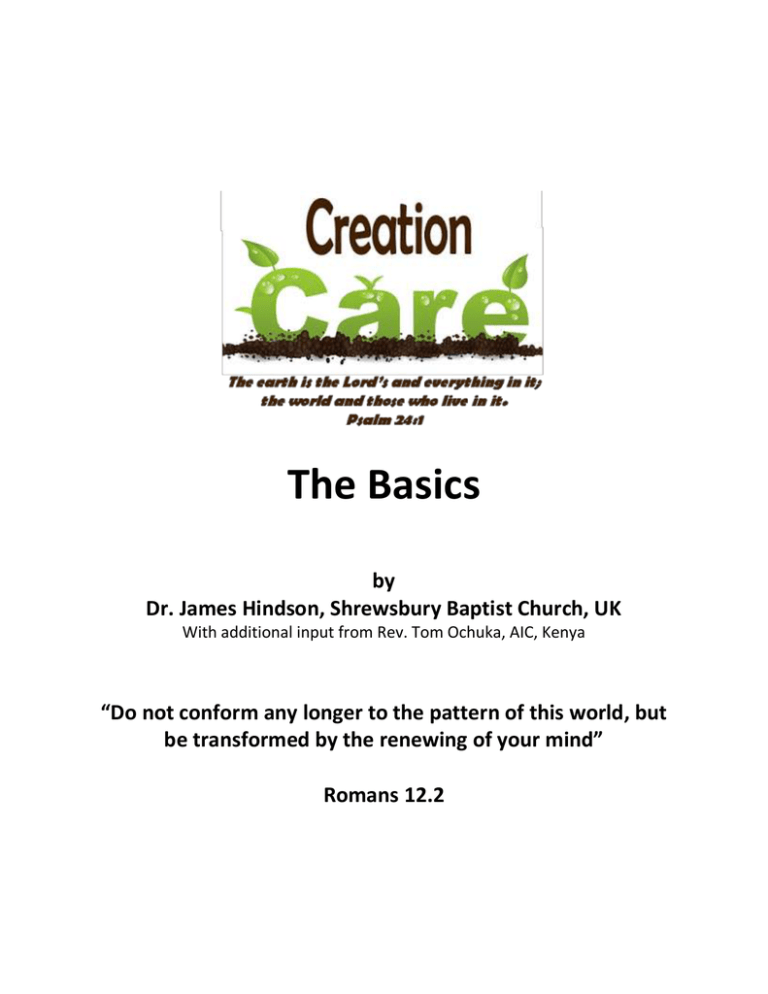
The Basics by Dr. James Hindson, Shrewsbury Baptist Church, UK With additional input from Rev. Tom Ochuka, AIC, Kenya “Do not conform any longer to the pattern of this world, but be transformed by the renewing of your mind” Romans 12.2 Introduction We live in beautiful and wonderful world that God has created for us. Hallejujah! Creation before the fall was perfect and although sin brought this perfection to an end, God can still be seen in creation. It still belongs to him and is still wonderful. He still cares for it as He still cares for us despite our sin. He graciously makes sure that His creation still provides despite the damage we do to His handiwork. Caring for Creation is an area of Christian life that has largely been ignored by many of God’s people but God has seen what we are doing to his Creation and how we are slowly undermining the basis for life and in his graciousness is now reminding us through is Spirit of the need for a right approach to Care. He has done this in the past with other issues. In the nineteenth century for example he called a group of Christians to fight against the Slave Trade. Now he is calling his people to Care for Creation more effectively. The purpose of this short booklet is to examine what the Bible says about Creation Care and to encourage us all do more to show our love to God and our neighbour through caring for God’s creation. 1 God and Creation – We live in God’s world! How different is our world today to how God planned it! For a Christian, the starting point for our Creation Care is the fact that our Triune God created this earth and everything in it. This is a theme throughout the whole Bible - from Genesis to Revelation. Genesis 1.1 describes how God the Father and the Spirit of God created this earth and John 1.3 and Colossians 1.15/16 tell us that the earth was created by Jesus. The earth did not evolve but was created by our powerful God. Because our God is a perfect God he created a perfect world. He could do nothing less and Genesis confirms this by saying that when God looked at his creation it was all “very good” (Genesis 1.31). Then we should remember that because God created this world, the whole of creation belongs to God. It is His earth, not ours (Psalm 24.1) and because we are a special part of that creation, made in God’s image, we also belong to Him (Genesis 1.27). We sometimes arrogantly think that we are in control of this world, but we are wrong. He is in total control of His creation (Psalm 65.9, Psalm 104, and Colossians 1.17). He holds all things together. Finally we should remember that Creation is complete. God created everything in six days and thene rested after he chad completed his creation. We cannot add to it or improve it. 2 WHY did God Create the Earth? You might never have asked this question, but why did God create His world? He didn’t have to! The Bible tells us some remarkable things in answer to this question. In Colossians Chapter 1.16 we are told the amazing fact that God made His world for Jesus. If nothing else this should motivate our care. We are living in a world created by God for His son! How can we even think about damaging this precious gift! But not only this. God also made this world for us and gave it to us as a gift for us to live in. In Psalm 115.16 we are told that “The Highest heavens belong to the Lord but the earth he has given to man.” This is wonderful – we share this earth as a joint gift from God to our Saviour and to us! What an honour – what an opportunity to serve Him through caring for creation! God has also provided his creation to communicate His Glory (Romans 1.20). This is why the natural environment is sometimes called “God’s Creation Word”. For those who have not yet heard His creation tells them all they need to know. This means that when we damage creation people have less chance to see God’s glory. All they see is man’s foolishness. Finally God has created the earth to feed us and provide generously for all our needs (Genesis 1.29) and also to give us pleasure. We are also told in Genesis that His creation is pleasing to the eye (Genesis 2.9). What a wonderful God – to care for us so much! 3 He expects us to look after His Creation Having given us the earth to look after he expects us to be good stewards and look after His creation. In Genesis He gives us several responsibilities. We should “Rule over” and “subdue” the earth (Genesis 1.26, 28). God has given us the task of managing his Creation. “Fill the earth” (Genesis 1.28). The whole earth is ours to use for His Glory “Work it” (Genesis 2.15). Ruling and subduing means we have to work to gain the blessings that creation grace brings. And the final instruction is to “Care for it” (2.15). Some of these words have been misinterpreted by many Christians in the past who thought that God was giving man an instruction to use and abuse the earth as we wanted. NO WAY! God expects to us obey these commands and care for creation in the same way the He would care for creation. We are His servants and should carry out his wishes in our care for creation in the same way as we follow His commands in other areas of our lives. We are made in His image (Genesis 1.27). All the commands need to be seen within the context of our love for God and our care for his creation. It is useful to think of how we care for our children. We only want good for our children, and we would never think of harming them. God expects us to have the same attitude towards not just other human beings, but also to His creation! That is an amazing thought. 4 But we have failed We live in a beautiful world and one that still provides for all our needs, but our sin has scarred and ruined both people and the rest of God’s creation (Genesis 3.17). Creation was affected by Adam’s fall as much as people. Both were in a sense, cut off from God. Paul, in his letter to the Romans tells us that the whole of creation is groaning as a result of this sin (Romans 8.19-22). It is an amazing thought that Creation is waiting for the return of Christ and a new heavens and new earth, as much as we are! Creation is also groaning because of what we are doing to it right now. We are using resources wastefully and we are throwing our waste back into the earth without much thought. We are also using God’s freely given resources unjustly so that some people consume far more than they need, whereas others are left without enough! Poverty, hunger, climate change, drought, poor water and hundreds of other ecological problems are all a result of our sin! We are damaging the Life Support Systems that God has provided. Some scientists say we are damaging it beyond repair. 5 Why have we done this – why have we messed up God’s creation? The basic cause is our human greed. We are not satisfied with the “enough” that Gods has given us. We want “more”! Our breaking of two of the Ten Commandments through our stealing and covetousness has got us into this problem (Exodus 20.15 and 17). Like the Rich Young Ruler, we have been deluded to trust in our own wealth and plans for the future (Luke 12.15) rather than trusting in God. Add to this the fact that most Christians just don’t THINK about caring for creation. Satan has hidden the importance of creation care from us meaning that our minds have not been transformed in this as they have in other ways (Romans 12.2). We are not being salt and light we should be (Matthew 5.13/14). For example, we don’t see the connection between Creation Care and loving our God and loving our Neighbour (Luke 10.25) and we don’t understand the full implications of creation being a gift to His Son Jesus, and we don’t trust God enough for His provision (Luke 12.22-31). All this leads to Ecological Sin and that on the Day of Judgment we shall have to give an account for how we have cared for creation as much as shall have to account for other aspects of our Christian lives. As Christians we would we would be worried if failed to pray, or didn’t read God’s word, or missed having fellowship with his people. We should be similarly concerned about not caring for creation. 6 So how should we behave? You might have heard of the “Three R’s” – Reuse, Reduce, and Recycle! Well for Christians there are the five R’s! We need to Realise that a lack of Creation Care is sin Repent of this sin Rethink our lifestyles and Rid ourselves of everything that hinders our Christian obedience (Hebrews 12.1). Stop harming the planet. In other words - stop sinning. So what is the fifth “R”? As Christians we shouldn’t be satisfied with just doing less harm. We should want to do good! Our fifth “R” is therefore to restore the earth – to try and bring it back to the paradise that we lost! All this means that we should make Creation Care a part of our discipleship – putting to death all those things that hinder our walk with God (Colossians 3.1-5). Creation Care is a Biblical Obligation – we don’t have to wait for the government or others to act – we should act in obedience to God and not wait for others. 7 God’s principles of Caring for Creation – his Written Word Having realised that our lack of Creation Care is sin and having repented of that sin – how should we live to honour God? Giving detailed rules and regulations is not how God works in other areas of our Christian lives and it is the same with Creation Care. God gives us principles that we have to put in practice in the situations that God has given us. These principles we can learn from both his written word, and his creation word. The most important principles from his Written Word can be summarized in one word “enough”. It is quite right to want to live a good quality of life and to have “enough” to live on happily and glorify God. There are plenty of exhortations in the Bible about just having “enough” – not too much because that is greedy and not too little, but enough. Whilst the people of Israel were in the wilderness God provided them with food to eat – and they were commanded to take just enough for each day (Exodus 16.4 and 21) and when they disobeyed him there was trouble (exodus 16.20) A second important principle is to ask ourselves – how does the way we live our lives demonstrate love for God and love for our neighbor? If we damage creation then we are not showing love to God, but also a damaged creation can harm our neighbour. In Luke 10.27 we are told to love our neighbour as we love ourselves. We would never think about harming creation in a way that harms ourselves, so we should think carefully about damaging creation in a way that hurts other people. And of course, we should remember that our neighbor is not just the family that lives next door to us. Jesus tells us that everyone is our neighbour! 8 God’s principles of Caring for Creation – his Creation Word The most important principle from God’s Creation Word is to “Consider the Lilies”. Luke clearly tells us in his Gospel that we should look at the natural world and learn from it (12.7). The lesson of these verses is about not worrying about the future – God will provide. But we can also ask what else can we learn from how God has created His natural world? God has designed His natural world to work in the following way and he wants us to try to put these principles into our daily living: In Gods natural world there is no waste – or rather all waste is designed as food for another part of the world. Think about it – leaves fall from a tree – and die and become food for the tree! No part of a natural world poisons another part, unless it has a purpose in being designed that way. In the natural world diversity is enhanced and everything fits together so support different parts of the system. God’s natural world uses only renewable energy and only as much as is needed, not more, nor less. Nothing is wasted. God’s natural world is both beautiful and effective, Finally God’s natural world produces an abundance. If we care for creation then there is more than enough food and shelter for all. Our God is a generous God. Just think how different these principles are to the way we do things at the moment? You could go through the list and see how we are breaking each one of these principles. Our world today is very much one of “taking from nature” and then “wasting what nature has provided”. God’s way of doing things is more “borrowing”, “using” and “returning” to God. 9 This all sounds great – but how do we do this in practice? Living Creation Care lives is a challenge, because our world is not deigned in the way that God requires. However there ARE things we can do! The problems are huge – but it’s a matter of obedience and we should always remember that God’s people can change things. In fact, Christians are the only group of people that have the right motivation to change things. Non-Christians are fearful of the future and care for nature because they are worried about the effect if they do not. Christians have no need of being fearful of the future – and we care creation because God has commanded us to! We need to look at our lifestyles and think – “how can we put God’s principles into action in our lives?” How can we be happy with “enough”. How can we do the right things that don’t damage the planet? And of course – we need to pray and talk to other Christians to work out what best to do. And we don’t have to worry if we cannot do everything at once. Nobody can. We must remember that if our hearts are seeking after pleasing God then we shall be forgiven if we can’t do all that he wants to. Some things are easy to do. Not using plastic bags and not throwing them away for example. That’s simple. Other things are more difficult. We have to do them to live and we sometimes don’t have other options. For example, we have to cook food for our families. This might mean cutting down a tree for firewood. If that is the case, then God will forgive us as long as we work towards making things better – not cutting down trees and maybe thinking about a different way of cooking. 10 Creation Care where you are - What’s the future? The relationships between quality of life, development, poverty and Creation Care are very complicated I live in a rich western country where Creation Care is about consuming less stuff and trying to live simpler life styles. Historically, we have been responsible for the climate change that is happening now. Creation Care in Kenya is going to be different, especially in parts of the country where people are not as rich materially. Of course people in Kenya damage God’s creation as well but in different ways to those of us in west. Even so – Kenyans damage Gods creation much less – about five times less to be exact! This means that it is not wrong for Christians in Kenya to want more of the important needs to give a good quality of life – electricity in homes, clean water and sanitation, enough food, good education and health care and the ability to travel for example. Wanting these things if you don’t have them is not wrong. There are some tough questions. For example, in my home I use electricity that comes from a power station using gas – that creates carbon dioxide that changes the climate. I have a car which damages Creation. Should I stop using these things? Some families in Kenya don’t have these things. Is it right to want them or not? How we answer these questions we always need to remind ourselves that the earth belongs to God – and that He is in control. We also believe that he doesn’t want His children to suffer and improving the quality of our lives is not wrong as along as it is within the context of “enough” and shows love for God and our neighbor! In the big picture of things the Earth is in God’s hands – not ours! 11. Creation Care Checklists for you and your Church These are just SOME ideas for you to think about in terms of changing your behaviour to Care for Creation more. Kenya is a wonderfully varied country and so not all the ideas might work for you. However, do think and pray about what you can do and as we said above – no one can do everything at once. It’s great that God looks at our hearts to see how we are trying to please him! If you have any other ideas then contact the Rev Tom Ochuka. The Rev Ochuka is the Health and Environment Officer for the AIC in Nyanza and will be able to share you ideas more widely. He can be contacted at If you live in a rural area then….. 1. 2. 3. 4. 5. 6. 7. 8. 9. 10. Don’t use plastic bags. Don’t buy them or take them free from shops. Plastic bags are made from valuable resources and are often thrown away where they can harm animals. If they are burnt they give off harmful gases. Use a cloth bag instead. In fact, try to avoid buying things in plastic at all!! Glass bottles are better than plastic for example. If you have electricity in your home, then switch off electrical appliances when they are not being used. Do think carefully about energy use. Even the red light on a television uses energy Wasting electricity not only wastes money but making electricity produces carbon dioxide and contributes towards climate change. If you don’t have electricity – don’t use kerosene lamps. Kerosene produces fumes harmful for health and also contributes towards climate change. Think about getting a solar instead. The AIC will be starting a scheme to help you buy one! Reduce the amount of firewood you use buy buying an energy efficient stove. If you buy firewood then it has often caused deforestation somewhere. A stove costs money but you will recover the costs in about 6 months through savings in firewood costs. Plant trees to make your own firewood. Trees cost as little as 10 shillings from a nursery. Why not plant five now and then two a year from then on. In three years time you will have you own source of firewood. You could save huge amounts of money over time! Have a compost heap. Don’t just throw away your organic waste but build your own compost heap. Not only will your yard look much tidier, but also the compost can be used on your land as a fertiliser and you plants will grow better. If you brush up your leaves then add these to the compost heap. It makes sense. Don’t wash motor bikes or bicycles and cars in rivers or lakes. The oil and dirt you wash off harms plants and animals in the water. Some people might also use the water for drinking as well or watering their crops. Think about a simple roof rainwater harvesting scheme. You don’t have to spend a lot of money to harvest rainwater when it falls. If you collect and store the water carefully, it is so much cleaner than water from a water seller or streams and ponds. The AIC produce a small leaflet on how you can build one. If you are a farmer then be careful about the amount of fertiliser you use. It is easy to use too much and this does the soil no good at all. Use organic fertiliser if possible and if you do use chemical fertilisers, then do read the instructions and use the right amount. Don’t litter! It is a sad truth that we Kenyans litter too much – we throw things away without thinking what we are doing to God’s creation. Recycle as much as you can and ask you Pastor whether your church does recycling. If you live in an urban area then….. 1. 2. 4. 5. 6. 7. 8. 9. 10. Don’t use plastic bags. For example, don’t buy them or take them free from shops. Plastic bags are made from valuable resources and are often thrown away as litter. If they are burnt they give off harmful gases. Use a cloth bag instead. In fact, try to avoid buying things in plastic at all!! Glass bottles are better than plastic for example. If you have electricity in your home, then switch off electrical appliances when they are not being used. Many people heat their homes when it is not needed and cool their homes with air conditioning too much (depending where you live in Kenya of course!). Even the red light on a television uses energy. Wasting electricity not only wastes money but making electricity produces carbon dioxide and contributes towards climate change. Plant trees. If you have any garden space then plant a few trees. Trees cost as little as 10 shillings from a nursery and as well as being beautiful they help to absorb carbon dioxide and reduce the impact of climate change Have a compost heap. Don’t just throw away your organic waste but build your own compost heap. A compost heap means less waste to go in your bin and if you are a gardener, then good compost will help your newly planted trees to grow! Transport. Moving around a town or city can be slow even using motorbikes, buses and matatu’s and all of these produce gases that change the climate of Kenya. How about walking more – the exercise is good for you or using a bicycle for longer distances? Think carefully before using your car as well. Reduce and recycle packaging. If you shop at a supermarket do be careful about the amount of packaging you end up buying. Say “no” if you can and do make an effort to recycle paper, cans, glass and anything that can be recycled in your city. Your Church might be able to help having a central collection point. In some towns people pay money for metal to recycle for example. Don’t waste water. Just because in a town water often comes from a central supply and out of a tap – it doesn’t mean you should waste it. Kenya is short of water after all and it is a precious resource. So do check on dripping taps, have showers not bathes and be carefully how much is used. Be careful what you put down the sink. A lot of detergents and washing up liquids contain phosphates that when they get into rivers and lakes they cause extra planet growth. This then reduces diversity and makes it difficult for fish to grow in rivers and ponds. There are some organic alternatives certainly for personal washing products so try using these. Don’t litter! It is a sad truth that we Kenyans litter too much – we throw things away without thinking what we are doing to God’s creation. We throw away sweet wrappers, bottles, plastic bags. Anything. It makes our country look a mess. Recycle as much as you can and ask you Pastor whether your church does recycling. Notes ___________________________________________________ ___________________________________________________ ___________________________________________________ ___________________________________________________ ___________________________________________________ ___________________________________________________ ___________________________________________________ ___________________________________________________ ___________________________________________________ ___________________________________________________ ___________________________________________________ ___________________________________________________ ___________________________________________________ ___________________________________________________ ___________________________________________________ ___________________________________________________ ___________________________________________________ ___________________________________________________ ___________________________________________________ ___________________________________________________ ___________________________________________________ ___________________________________________________ ___________________________________________________ ___________________________________________________
